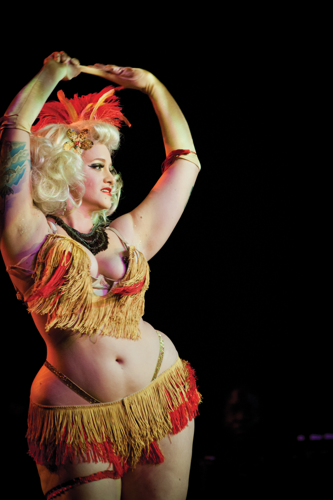
Freya West
Onstage, burlesque performer Freya West exudes classic Old Hollywood glamour. During many of her performances, she wears feathered headpieces, beaded bras and sheer, flowing robes. She’s a vision. It’s easy to imagine her in A Chorus Line, or as a leading lady in one of George Cukor’s screwball romantic comedies. Blond like Jean Harlow. Elegant like Hedy Lamarr. But West doesn’t have the body of an Old Hollywood starlet — and she’s fine with that.
“Burlesque has always been this sort of rebellious act of women behaving badly,” says West, “of taking back the male gaze and saying, ‘If you’re going to objectify us, objectify this.’ Let me do something that’s weird or be glamorous on my own terms.”
West is co-founder of the local burlesque school Delinquent Debutantes, and she’s heading up the second annual Nashville Burlesque Festival. The three-day event kicks off Thursday, Sept. 12, at Corsair Distillery in Wedgewood-Houston with a showcase featuring local performers alongside Austin, Texas-based performer Chola Magnolia. Chola calls herself “The Baddest Blossom From the Barrio” and is involved with several plus-size companies and companies run by people of color in Texas.
Other headliners at the festival include Jezebel Express, Jet Noir and Michelle L’amour — who was West’s first teacher. L’amour modeled how to “revel in a cultivation of beauty that I didn’t know was possible,” West says.
West stresses that whatever you think burlesque is, you’re probably wrong. Each act tells a story. Some performers take their clothes off. Others put clothes on. They create characters and narratives, choreograph their acts and often make their own costumes. And like many artforms, burlesque is evolving to be more inclusive of performers of varying sizes, ethnic backgrounds, abilities and gender identities.

Jeez Loueez
When New Orleans-based performer Jeez Loueez got her start in Chicago, she would look out at the audience and note the lack of diversity. She believed that if black and brown people saw themselves reflected in the performances, they would turn out in droves.
“One of the ways to get more black and brown people onstage,” Loueez says, “is to get together and create our own shows.”
Her company, Jeezy’s Juke Joint, features black and brown people of various performing styles.
Loueez will perform at the Nashville Burlesque Festival’s Friday Night Showcase and host the Saturday Night Spectacular, both at The Nashville Palace. With an in-your-face style and killer dance moves, Jeez is a ton of fun, and she’ll also teach one of the workshops offered at the fest. In the first half-hour of her class, titled Twerk and Jerk: Booty Intensive Twerkshop, participants will learn about the etymology of the word “twerk” as well as its history — yes, there’s a history behind twerking.
Other workshops include Cha-Cha With Chola Magnolia, Pussy Confidence With Michelle L’amour, and Creative Costuming and How to Leave Them Gagging With Aria Delanoche.
As an instructor, Loueez says a lot of the work is in helping students build their confidence. “It’s hard for people to be vulnerable and let their guard down,” she says. “Even in the safe space of a classroom.”
For West, starting to perform burlesque 10 years ago facilitated a personal journey of acceptance and self-love.
“We have so many issues around our bodies that are wrapped up in our self-worth,” says West. “[With burlesque], we get to celebrate our bodies, instead of feeling like we have to hide them. … Being onstage and saying, ‘Hey, my body’s valid, and my body’s sexy and funny and can be all of these things,’ is really empowering for me.”







